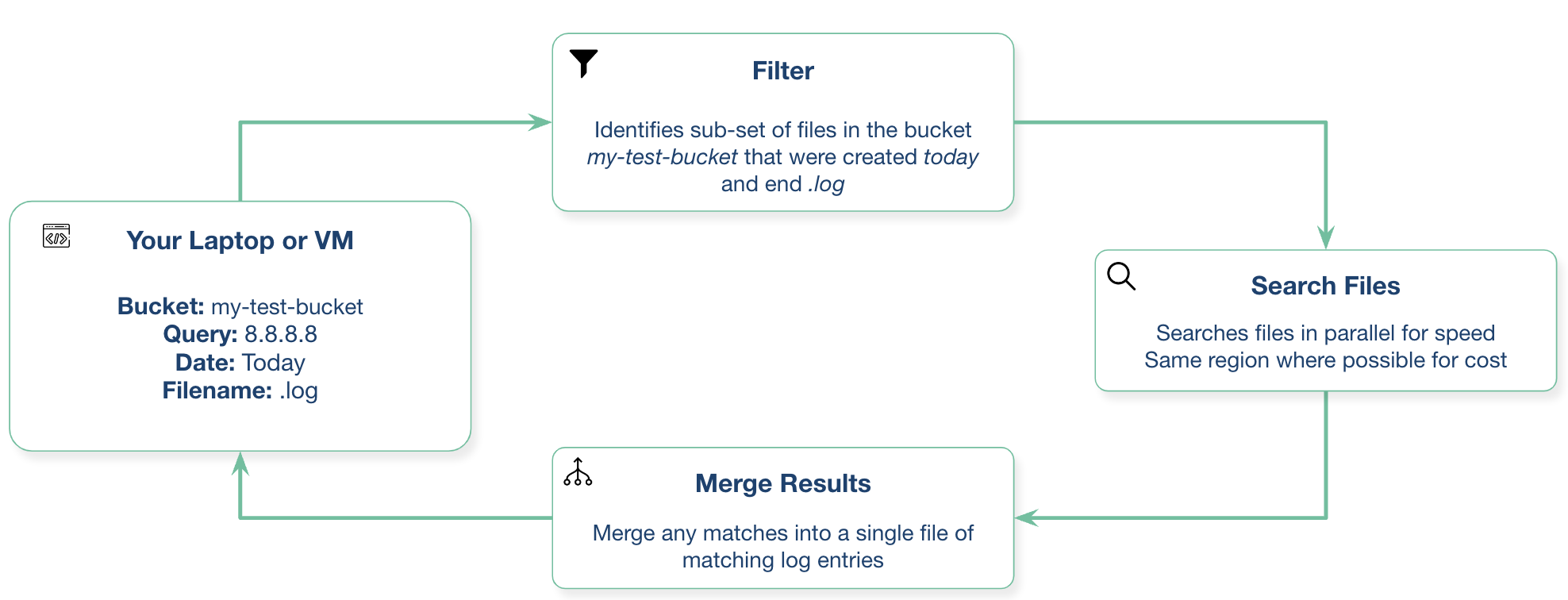cloudgrep pesquisa armazenamento em nuvem.

Atualmente, ele suporta a pesquisa de arquivos de log, opcionalmente compactados com gzip (.gz) ou zip (.zip), no AWS S3, Azure Storage ou Google Cloud Storage.

Exemplo simples:
./cloudgrep --bucket test-s3-access-logs --query 9RXXKPREHHTFQD77
python3 cloudgrep.py -b test-s3-access-logs -q 9RXXKPREHHTFQD77
Exemplo simples do Azure:
python3 cloudgrep.py -an some_account -cn some_container -q my_search
Exemplo simples do Google:
python3 cloudgrep.py -gb my-gcp-bucket -q my_search
Exemplo simples de log do CloudTrail, gerando resultados como JSON:
python3 cloudgrep.py -b test-s3-access-logs -q 9RXXKPREHHTFQD77 -lt cloudtrail -jo
Exemplo simples de log personalizado:
python3 cloudgrep.py -b test-s3-access-logs -q 9RXXKPREHHTFQD77 -lf json -lp Records
Exemplo mais complicado:
python3 cloudgrep.py -b test-s3-access-logs --prefix "logs/" --filename ".log" -q 9RXXKPREHHTFQD77 -s "2023-01-09 20:30:00" -e "2023-01-09 20:45:00" --file_size 10000 --debug
Salvando a saída em um arquivo:
python3 cloudgrep.py -b test-s3-access-logs -q 9RXXKPREHHTFQD77 --hide_filenames > matching_events.log
Exemplo de saída:
[2023-11-30 13:37:12,416] - Bucket is in region: us-east-2 : Search from the same region to avoid egress charges.
[2023-11-30 13:37:12,417] - Searching 11 files in test-s3-access-logs for 9RXXKPREHHTFQD77...
{"key_name": "access2023-01-09-20-34-20-EAC533CB93B4ACBE", "line": "abbd82b5ad5dc5d024cd1841d19c0cf2fd7472c47a1501ececde37fe91adc510 bucket-72561-s3bucketalt-1my9piwesfim7 [09/Jan/2023:19:20:00 +0000] 1.125.222.333 arn:aws:sts::000011110470:assumed-role/bucket-72561-myResponseRole-1WP2IOKDV7B4Y/1673265251.340187 9RXXKPREHHTFQD77 REST.GET.BUCKET - "GET /?list-type=2&prefix=-collector%2Fproject-&start-after=&encoding-type=url HTTP/1.1" 200 - 946 - 33 32 "-" "Boto3/1.21.24 Python/3.9.2 Linux/5.10.0-10-cloud-amd64 Botocore/1.24.46" - aNPuHKw== SigV4 ECDHE-RSA-AES128-GCM-SHA256 AuthHeader bucket-72561-s3bucketalt-1my9piwesfim7.s3.us-east-2.amazonaws.com TLSv1.2 - -"}
usage: cloudgrep.py [-h] [-b BUCKET] [-an ACCOUNT_NAME] [-cn CONTAINER_NAME] [-gb GOOGLE_BUCKET] [-q QUERY]
[-v FILE] [-y YARA] [-p PREFIX] [-f FILENAME] [-s START_DATE] [-e END_DATE]
[-fs FILE_SIZE] [-pr PROFILE] [-d] [-hf] [-lt LOG_TYPE] [-lf LOG_FORMAT]
[-lp LOG_PROPERTIES] [-jo JSON_OUTPUT]
CloudGrep searches is grep for cloud storage like S3 and Azure Storage. Version: 1.0.5
options:
-h, --help show this help message and exit
-b BUCKET, --bucket BUCKET
AWS S3 Bucket to search. E.g. my-bucket
-an ACCOUNT_NAME, --account-name ACCOUNT_NAME
Azure Account Name to Search
-cn CONTAINER_NAME, --container-name CONTAINER_NAME
Azure Container Name to Search
-gb GOOGLE_BUCKET, --google-bucket GOOGLE_BUCKET
Google Cloud Bucket to Search
-q QUERY, --query QUERY
Text to search for. Will be parsed as a Regex. E.g. example.com
-v FILE, --file FILE File containing a list of words or regular expressions to search for. One per line.
-y YARA, --yara YARA File containing Yara rules to scan files.
-p PREFIX, --prefix PREFIX
Optionally filter on the start of the Object name. E.g. logs/
-f FILENAME, --filename FILENAME
Optionally filter on Objects that match a keyword. E.g. .log.gz
-s START_DATE, --start_date START_DATE
Optionally filter on Objects modified after a Date or Time. E.g. 2022-01-01
-e END_DATE, --end_date END_DATE
Optionally filter on Objects modified before a Date or Time. E.g. 2022-01-01
-fs FILE_SIZE, --file_size FILE_SIZE
Optionally filter on Objects smaller than a file size, in bytes. Defaults to 100 Mb.
-pr PROFILE, --profile PROFILE
Set an AWS profile to use. E.g. default, dev, prod.
-d, --debug Enable Debug logging.
-hf, --hide_filenames
Dont show matching filenames.
-lt LOG_TYPE, --log_type LOG_TYPE
Return individual matching log entries based on pre-defined log types, otherwise
custom log_format and log_properties can be used. E.g. cloudtrail.
-lf LOG_FORMAT, --log_format LOG_FORMAT
Define custom log format of raw file to parse before applying search logic. Used if
--log_type is not defined. E.g. json.
-lp LOG_PROPERTIES, --log_properties LOG_PROPERTIES
Define custom list of properties to traverse to dynamically extract final list of log
records. Used if --log_type is not defined. E.g. [Records].
-jo JSON_OUTPUT, --json_output JSON_OUTPUT
Output as JSON.
Instale com: pip3 install -r requirements.txt Ou baixe a versão compilada mais recente aqui
Você pode executar isso em seu laptop local ou em uma máquina virtual em seu provedor de nuvem.
Isso requer python3.10 ou posterior
Construa com: docker build -t cloudgrep .
Execute com: docker run --rm -ti cloudgrep
Para passar variáveis de ambiente, por exemplo, para AWS: docker run --rm --env-file <(env|grep AWS) -ti cloudgrep
Seu sistema precisará de acesso ao bucket S3. Por exemplo, se você estiver executando em seu laptop, precisará configurar a AWS CLI. Se você estiver executando um EC2, um perfil de instância provavelmente será a melhor escolha.
Se você executar em uma instância do EC2 na mesma região do bucket S3 com um VPC endpoint para S3, poderá evitar cobranças de saída. Você pode autenticar de várias maneiras.
A maneira mais simples de autenticar com o Azure é primeiro executar:
az login
Isso abrirá uma janela do navegador e solicitará que você faça login no Azure.
Você precisará criar uma conta de serviço e baixar o arquivo de credenciais e definir com:
export GOOGLE_APPLICATION_CREDENTIALS="/Users/creds.json"
Agradecemos qualquer contribuição para este projeto! Adicione por meio de uma solicitação pull.
Possíveis trabalhos futuros poderão incluir:
Abra um problema do GitHub se tiver alguma dúvida ou sugestão. Este não é um produto Cado Security com suporte oficial.